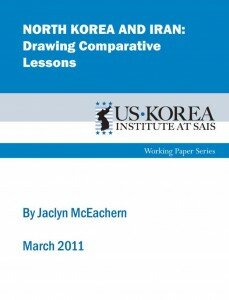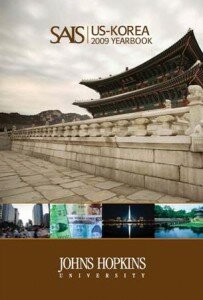 The U.S.-Korea Institute at SAIS and the Center for the National Interest are pleased to announce the release of the joint report “Northeast Asia in Afghanistan: Whose Silk Road?“, co-authored by Jae H. Ku, Drew Thompson, and Daniel Wertz.
The U.S.-Korea Institute at SAIS and the Center for the National Interest are pleased to announce the release of the joint report “Northeast Asia in Afghanistan: Whose Silk Road?“, co-authored by Jae H. Ku, Drew Thompson, and Daniel Wertz.
Stories Filed Under “Northeast Asia”
Report Release: Northeast Asia in Afghanistan
 The U.S.-Korea Institute at SAIS and the Center for the National Interest are pleased to announce the release of the joint report “Northeast Asia in Afghanistan: Whose Silk Road?“, co-authored by Jae H. Ku, Drew Thompson, and Daniel Wertz.
The U.S.-Korea Institute at SAIS and the Center for the National Interest are pleased to announce the release of the joint report “Northeast Asia in Afghanistan: Whose Silk Road?“, co-authored by Jae H. Ku, Drew Thompson, and Daniel Wertz.
North Korea and Iran: Drawing Comparative Lessons
 In a new USKI Working Paper, Jaclyn McEachern examines the analogies that have been drawn between North Korea and Iran, to help identify the limitations of each when trying to inform policy preferences. In doing so, she identifies four areas in which lessons can be extracted and applied in a cross-context setting. Download the paper here.
In a new USKI Working Paper, Jaclyn McEachern examines the analogies that have been drawn between North Korea and Iran, to help identify the limitations of each when trying to inform policy preferences. In doing so, she identifies four areas in which lessons can be extracted and applied in a cross-context setting. Download the paper here.
State of the World Economy, 2011-2012: Whither or Wither?
On November 18, 2010, the U.S.-Korea Institute at SAIS and Korea Institute of Finance, sponsored by the Asian Studies Program at SAIS and JoongAng Ilbo, will host a one-day conference, entitled “State of the World Economy, 2011-2012: Whither or Wither?” in celebration of Korea Institute of Finance’s 20th anniversay, 1991-2011.
This conference will consist of three sessions: Whither the Global Economy; Demand, Deflation, and Debt in the “Locomotive” Economies; and Implications and Future of the Korean Economy; and will feature such noted economists as Kevin O’Rourke, John Taylor, Dan Rosen, Marcus Noland, Roger Leeds, Peter Heller and more. Special addresses will be delivered by the Honorable Han Duk-soo, ROK Ambassador to the United States, and Dr. Chung Duck-koo, Chairman of the North East Asia Research Foundation.
Download the conference proceedings here.
North Korea’s Growing Dependence on China: Implications for the Future of Northeast Asia
On September 23, 2010, USKI and the Sejong Society of Washington, D.C. hosted a talk with the Venerable Pomnyun Sunim, who discussed the DPRK’s increasing economic dependency on China and touched on strategic possibilities for the U.S. and South Korea to approach the China-DPRK relationship.
DOWNLOAD
Transcript | “North Korea’s Growing Dependence on China: Implications for the Future of Northeast Asia” (Sept. 23, 2010)
2009 SAIS U.S.-Korea Yearbook
 The U.S.-Korea Institute at SAIS annouces the release of the fourth edition of the SAIS U.S. -Korea Yearbook.
The U.S.-Korea Institute at SAIS annouces the release of the fourth edition of the SAIS U.S. -Korea Yearbook.
Each fall semester at SAIS, the Korea Studies Program offers the course, “The Two Koreas: Contemporary Research and Record,” where students prepare an in-depth report on an issue of importance to Korean affairs in that year. As part of their research, students make a one-week research trip to Seoul to test their ideas with experts and officials. The SAIS U.S.-Korea Yearbook is a compilation of these student papers.
Student authors include: Tze Chin “Alvin” Wong, Paul Elliott, Sogaku Miyamoto, Ian Howard, Kee Hoon Chung, Jason Park, Momoko Sato, Neil K. Shenai, Nick Borst, Naoko Aoki, Zander Lanfried, and Sarah Yun.
Download the 2009 SAIS U.S.-Korea Yearbook.
Special Report: U.S. Strategy Towards North Korea: Rebuilding Dialogue and Engagement
 A U.S. policy based on containment and isolation alone only concedes that North Korea will remain nuclear-armed and that its weapons programs will further develop. That, in turn, will undermine stability in East Asia, sow doubts in Tokyo and Seoul about relying too much on the United States for their security and jeopardize cooperation with China. A nuclear North will also undermine Washington’s global disarmament and non-proliferation agenda, particularly when viewed in conjunction with the danger of a nuclear Iran. The threat may become even more direct to U.S. security if the North perfects a long-range missile delivery system or exports fissile material or nuclear technology.
A U.S. policy based on containment and isolation alone only concedes that North Korea will remain nuclear-armed and that its weapons programs will further develop. That, in turn, will undermine stability in East Asia, sow doubts in Tokyo and Seoul about relying too much on the United States for their security and jeopardize cooperation with China. A nuclear North will also undermine Washington’s global disarmament and non-proliferation agenda, particularly when viewed in conjunction with the danger of a nuclear Iran. The threat may become even more direct to U.S. security if the North perfects a long-range missile delivery system or exports fissile material or nuclear technology.
An effective American strategy towards North Korea will require a combination of tough measures with serious dialogue and engagement. “U.S. Strategy Towards North Korea: Rebuilding Dialogue and Engagement,” a new report by Joel S. Wit, discusses current developments in North Korea and, in that context, lays out a realistic set of U.S. objectives and recommendations for dealing with Pyongyang through dialogue and engagement. While that plan focuses on the United States, it should be noted that consultation and cooperation with key allies as well as with China, Russia and the international community will be central to its implementation.
This report is a joint U.S.-Korea Institute at SAIS and Weatherhead East Asian Institute at Columbia University publication.
Executive Summary: U.S. Strategy Towards North Korea, by Joel S. Wit (USKI: October 2009)
Full Report: “U.S. Strategy Towards North Korea: Rebuilding Dialogue and Engagement”, by Joel S. Wit (USKI: October 2009)
Supplemental Materials: Table 1, Table 2, Table 3
In writing this report, Joel Wit, the principal author, was assisted by a number of prominent experts who provided background papers for this study. These experts included: Bradley Babson, John Feffer, David Von Hippel, Peter Hayes, Karin Lee, Patrick Morgan, William Newcomb, Alan Romberg, Sharon Squassoni, Fred McGoldrick, Lee Sigal, and David Wright. Copies of their background papers can be accessed through the Nautilus Institute and the National Committee for North Korea.
Many thanks to the Ploughshares Fund for their support of this project.
Joel S. Wit is a visiting scholar at the U.S.-Korea Institute at the Paul H. Nitze School of Advanced International Studies (SAIS) at Johns Hopkins University and an adjunct senior research fellow at the Weatherhead East Asia Institute at Columbia University. Wit is a former State Department official who worked on U.S. policy towards North Korea from 1993 to 2002, first as a senior advisor to Ambassador Robert L. Gallucci and then as the coordinator for the implementation of the 1994 U.S.-North Korea Agreed Framework. After leaving the State Department, he was as visiting scholar at the Brookings Institution from 2000 to 2002 and subsequently senior fellow at the Center for Strategic and International Studies (CSIS) until 2005. Wit is the co-author of Going Critical: The First North Korean Nuclear Crisis.
USKI Report quoted on North Korea Nuclear Testing
USKI Report, Flood Across the Border, was quoted by The Australian in an article entitled, “US needs Beijing’s Support Over North Korea’s Bomb Test.” Read it here

